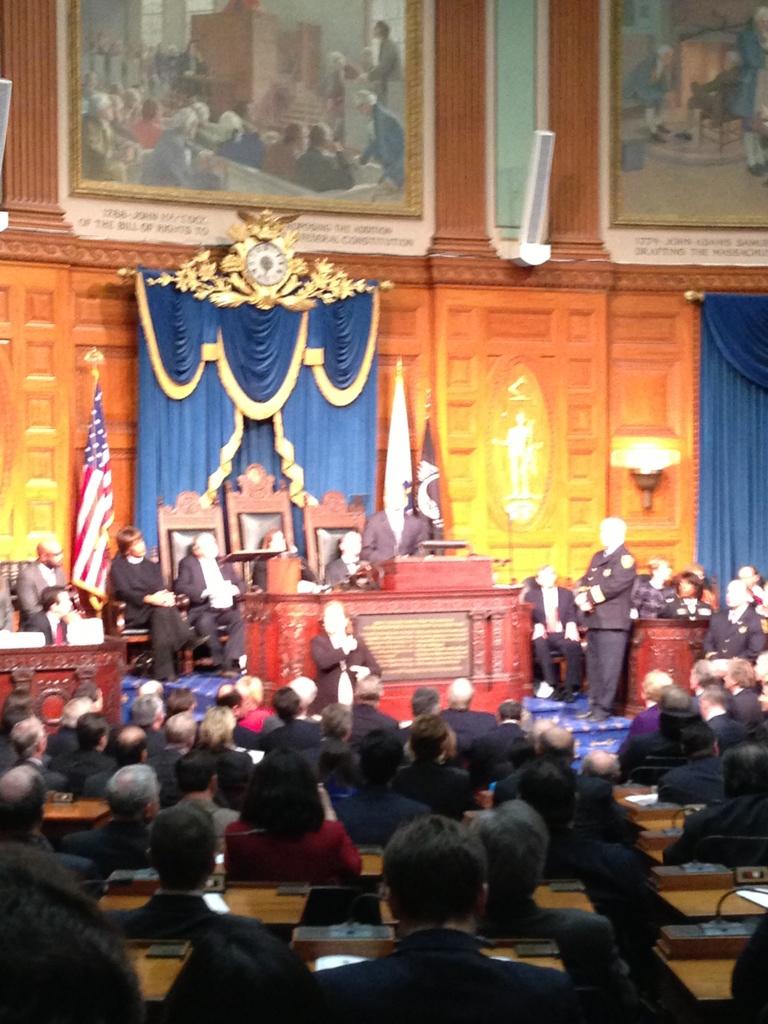Analysis: Two Years Left, Patrick Seeks Investment-um…
In his 2013 State of the Commonwealth address, Governor Deval Patrick laid out a bold vision for the commonwealth urging higher income taxes, offset, in part, by lower sales tax. The Governor is attempting to make his final two years in office as worthwhile as possible. He did that this evening with a well-prepared and focused speech that placed a special emphasis on raising revenue to invest in education and infrastructure.
Patrick’s speech principally focused on education, infrastructure and the means to pay for it. However, he did also mention efforts to streamline government and reduce burdens on businesses.
While a bit steeper an income increase and an unexpected sales tax decrease, Patrick’s proposal does appear to mirror the effort to pass An Act to Invest in Our Communities. The act is backed by a coalition of community organizations, unions, and public interest groups, called the Campaign for Our Communities. That legislation would raise the income tax, but offset its impact upon most families with a larger deducion, effectively cancelling out the increase in tax rates.

Governor Patrick Giving His Address to Joint Session of Legislature (Gov. Patrick’s Ofc via Twitter)
Patrick also called for more regional parity in transportation investments, which would come as a relief to Western Mass. The region is looking at major repairs to the I-91 viaduct in Springfield and commuter rail developments along the Connecticut River from Connecticut to Vermont.
Earlier in the week, Patrick proposed a host of tax increases to finance the transportation aspects.
Many of Patrick’s proposals have a very good chance of passage. Inevitably, they will be changed and reformed as it winds its way through the legislature. House Speaker Robert DeLeo will probably temper the reforms the most since the House is at this moment the more conservative of the two chambers of the legislature.
Indeed, Patrick may be shooting high to get a smaller increase that can do much of what he wants. Certainly, the Commonwealth can use $2 billion more, but $1.5 billion, for example, could still be a huge shot in the arm.
However, that also scrambles the Campaign for our Communities’s goals. The goals of the Governor’s efforts and Our Communities are clearly related, and maybe even the same. Both would be an investment in education, both primary/secondary and higher education. And both would create a fairer tax system.
At the same time, the governor’s proposal is focused primarily at transportation and education. Our Communities’s Act to Invest would fund health care, environmental programs and local aid. Cities and towns, particularly Springfield, have been devastated by the local aid cuts in particular. While Springfield absolutely needs more education funding, increasing education aid while leaving local aid static is a cut because the city must maintain its proportional match of the aid the state gives the city for education.
It is possible that the governor is just throwing out everything on transportation revenue and on revenue generally and hoping some of it will stick. That could work, but it does seem dangerous to become reliant on the income tax and then dedicate the sales tax to infrastructure. While sales tax revenue falls in recession, too, income tax revenue falls more sharply because of lost jobs. Unemployment can partially sustain transactions that are subject to sales tax.

Senator Eldridge (senatoreldridge.com)
The governor’s staff had to know that Our Communities’s Act to Invest was going to get a strong push. More importantly, liberals seem happy with the governor’s speech overall. Reached via Twitter, Jamie Eldridge, one of the more liberal members of the State Senate, agreed that the Act to Invest would cover a whole lot more than Patrick’s proposal. However, he also noted that governor was looking at more progressive tax system either way.
Establishing a progressive tax system is difficult in the commonwealth, especially the income tax, because the Massachusetts constitution prohibits graduated income taxes. Therefore, it is clear why Eldridge and his like-minded colleagues, like Senator Sonia Chang-Diaz are happy with the governor’s speech. They know that he is on their side in this fight.
Adding progressiveness to the commonwealth’s tax code is good way to strengthen revenue now in order to pay for critical investments. Certainly a growing economy would be the optimal way to increase revenue, but that will not happen quickly enough under the rosiest of predictions to fund Massachusetts’s investments now.
There really is not much to complain about in terms of transportation. Patrick’s proposed policies are sound and he rightly notes that Bay Staters want more transportation. However, that was not the only dimension of Patrick’s speech.
If the governor shows the necessary flexibility or simply gets behind the broader goals and policy of Our Communities, then the themes Patrick offered are right on message. Patrick wants a legacy and that is fine Moreover, responsibly funding education and transportation can and should be done. However, the commonwealth has many needs, which must be addressed with added revenue. If the governor and legislature adopts these principles and is careful how it raises taxes to do it, the plan can work out for the better of everyone in the commonwealth.
